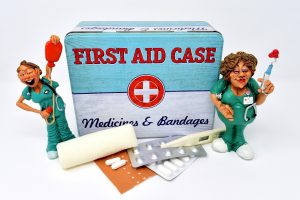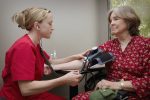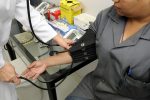
The medical field is understaffed, and everyone knows this.
This became more evident especially after the events of 2020.
Some of the patients don’t need to be in a facility at all times.
They can receive their treatment at home, and this is where travel PCTs come into the picture.
Through this article, you’ll learn all about travel PCT: jobs, training, salary, and everything else.
Read on if you’re interested in such a job!
Page Navigation
What Is a Travel PCT?
As you may have realized, PCT stands for patient care technician.
There is a slight difference between a “standard patient care tech” and a “travel PCT.”
We obviously have to clearly define this difference.
Travel PCT Employment
The difference comes from the environment in which the professional works.
A standard patient care tech works in settings such as these:
- Clinics
- Various rehabilitation centers
- Facilities for long term care and assisted living
- Hospices
- Hospitals
The travel patient care technician has to go to the patient’s house.
Travel patient care techs might also have to go to various facilities to perform their duties, not just the home of those needing their help.
The “travel” part in the name of the job makes a reference to the fact that the job is not affixed to a specific location or address.
These professionals perform “home calls,” not traveling abroad or working on a plane as one might have imagined.
Travel PCT Job Description
So, what does the job of a travel patient care technician entail?
The majority of the tasks of this occupation are identical to those of patient care techs working in normal conditions.
Here are some of the tasks:
- Helping the patients with their hygiene
- Monitoring the vitals of the patients
- Talking to the patients’ families
- Collecting blood or urine samples
- Taking the samples to the lab
- Maintaining rooms clean
- Performing catheter care – where needed
- Feeding patients
- Performing CPR if needed
Additionally, you’ll have to somehow commute to where the patient is.
You’ll be performing all these duties at the location of the patient.
The tasks could vary from one patient to the next, as each person has different needs.
The needs of those in your care might be mentioned when you get hired.
This also means you won’t be spending the same amount of time will all clients.
Requirements to Become a Travel PCT
Of course, you might wonder what does it take to get hired as a travel patient care technician.
Just like with any other job, you’ll have to meet some prerequisites.
Normally, the candidates for this position are asked for the following:
- Having physical stamina
- Having very good communication skills
- Being compassionate
- Having a clean criminal record
- Passing a drug test
- Having several certifications
- Being detail-oriented
- Being registered with the Nurse Aide Registry
Clearly, these attributes will show you’re a trustworthy person, who knows what they’re supposed to do.
They also show you’re someone who is easy to get along with.
However, since you’ll need to go to various places to do your job, you must be willing to drive or commute to your destination and back.
Depending on the employer, you could be asked for extra attributes, such as:
- A driver’s license
- Previous experience
- Ability to cook
Travel PCT Training and Education
You might wonder where can you learn everything that needs to be done by these professionals?
This is a valid question since some of the tasks have a medical aspect, requiring specific skills and know-how.
In fact, you can train as a travel PCT through one of the many educational programs available.
You can become a technician for patient care in as short of a time as a few months.
Through this education, you can obtain a certificate.
You can look at the programs with a duration of about a year.
At the end of these courses, you qualify for a diploma.
Even more study, of up to 2 years, can earn you an Associates’ Degree diploma.
The schools need to be accredited, but they can be found all across the country.

The classes can be attended both online and in-person, either as a full-time student or studying part-time.
Most schools will want you to get vaccinated before enrolling and even a minimum grade in some subjects.
Those subjects could be taken at the school offering such programs.
Additionally, you might learn CPR either in the preparatory classes or during the actual program.
And now, you can have a look at the actual classes you will attend in these patient care technician courses:
- Patient care
- Medical terms and abbreviations
- Nutrition
- Patient charting 101
- Introduction to anatomy
- Patient cleanliness
- Reading vital signs
- Compliance
- Safety
- Professional responsibility
- Infection Control
- Phlebotomy
- EKG
Certification for a Travel PCT
Just like “regular” patient care technicians, travel PCTs also need certification.
Probably the certification is more needed for these professionals than it is for those who work in a given location.
Without certification, patient care technicians cannot be enlisted in the Nurse Aide Registry of the state.
The credential is earned through the National Health Association.
The Association requires candidates to either graduate from a training program as mentioned earlier or to have a minimum of 1 year of experience.
The experience accepted is normally as a certified nurse assistant.
Once you made sure you meet all the requirements for certification, it’s time you sat through the exam.
This test is called patient care technician or assistant exam, has a duration of about 2 hours, and a total of 120 questions.
This exam costs $149, but you might have already paid for it through the school’s tuition.
You might need some extra help to prepare for this test.
The NHA has various resources that come at the cost of $155 per resource.
You’ll be tested on the following topics:
- Patient care
- Compliance
- Safety
- Professional Responsibility
- Infection Control
- Phlebotomy
- EKG
You’ll also have to make sure you have a driving license if you need to drive to where you’re expected.
Travel PCT Salary
Of course, nobody works for free, unless they volunteer.
“Regular patient care technicians and traveling ones have many duties in common.
They also have the same type of certification and education.
Despite this, their salaries are not identical.
Patient care techs that work in a single location earn on average, around $34,500 per year.
Travel patient care technicians have a much higher salary on average.
These professionals earn on average, $59,000 annually.
When you’ll first start this career, you can expect to earn closer to $28,000 a year.
Top earners can make a 6 figure salary, though an annual wage of around $89,000 is more realistic to expect when you’ll have more experience.
It goes without saying that these numbers will depend on many factors, including experience and additional competencies.
Conclusion
We hope that if you ever considered becoming a travel PCT instead of a PCT in a hospital, now you know more of what to expect from the job.
It’s pretty clear that by getting the education and certification as a patient care tech, you are already qualified to become a travel PCT.
You might have to negotiate with your employer the commuting to the patients’ homes aspect.
You might be given a work car or be recompensated for the gas and other things you might need to be able to perform your duties.








